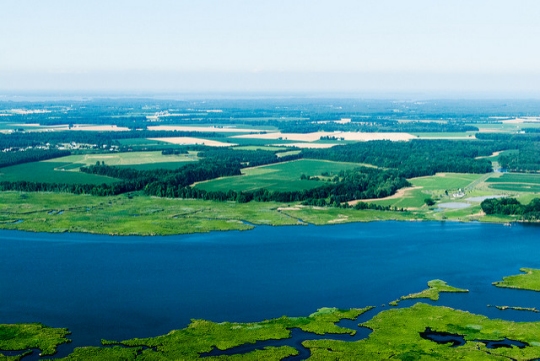 The Choptank Wetlands Preserve and the Choptank River are bordered by farm land in Easton, Md., on June 18, 2010. (Photo by Matt Rath/Chesapeake Bay Program, CC BY-NC 2.0 via Flickr)
The Choptank Wetlands Preserve and the Choptank River are bordered by farm land in Easton, Md., on June 18, 2010. (Photo by Matt Rath/Chesapeake Bay Program, CC BY-NC 2.0 via Flickr)No one today lives and works closer to our land and water than America's farmers. As agriculture secretaries and commissioners from Chesapeake Bay region states, we value and strongly appreciate the contributions that our 141,000 farmers make—in jobs and economic impact, in environmental stewardship, and in producing food for our region, nation and the world.
Among our five states—Delaware, Maryland, Pennsylvania, Virginia and West Virginia—there are more than 9 million acres of harvested cropland, or roughly the same size as 4.4 million city blocks. Our farmers raise more than 1 billion chickens for meat each year, grow fruits and vegetables on more than 143,000 acres, and produce enough milk to supply nearly a quarter of the U.S. population.
These incredible numbers stem directly from the hard work and dedication of our farm families. Contrary to popular misconception, more than 98 percent of our states' farms are family-owned—a truly staggering fact.
Many people are concerned about the health of the Chesapeake Bay—none more so than farmers, who rely on our land and water to grow so much food. That's why they and we were pleased to hear recent reports from the Chesapeake Bay Program that estimated nitrogen, phosphorous, and sediment going into the Bay have all dropped over the last six years—by eight, twenty, and seven percent, respectively. The University of Maryland's Center for Environmental Science recently gave the Bay its third highest health score in three decades, noting progress in several areas. And monitoring data from the U.S. Geological Survey indicates that the per-acre nutrient and sediment loads are declining at a majority of the monitoring stations across our five states.
That's a reflection of the progress in a variety of sectors, including wastewater treatment, storm water management, urban runoff, and agriculture. For our farmers, it's the latest news that their hard work is paying off. Our agencies work closely with our sister state-level environmental partners and the U.S. Environmental Protection Agency, but the real praise should go to the farmers. The practices they use and the strategies and plans they have put in place truly are making a difference.
Just as a great deal of attention has been paid to the Bay over the last decade, a similar focus on agriculture is warranted from policymakers at all levels to make sure policies are in place that allow for safe, affordable, and abundant food for the future. Some might think having productive farms and clean water are contradictory pursuits. They are not. Clean water depends on healthy, viable farms and healthy, viable farms depend on clean water. Achieving both is our goal.
Everyone who cares about food and is concerned about our water resources cannot just sit back and watch; we must act so we do not jeopardize our ability to maintain and enhance food production. All people involved in these discussions should be conscious of the need to improve water quality without compromising our potential to grow food because the future demands it.
There are several billion people in the world today. There will be another two billion people inhabiting the planet by 2050. Feeding a world of nine billion people makes American agriculture—and the co-equal goals of healthy farms and clean water—all the more important. Yes, there is more work to do, but we are taking the right steps now, acting with proper deliberation, to ensure that policymakers 30 years from now will not find themselves examining why we have lost our ability to produce food here in the Chesapeake Bay watershed.
Ed Kee is Delaware secretary of agriculture; Joe Bartenfelder is Maryland secretary of agriculture; Russell Redding is Pennsylvania secretary of agriculture; Todd Haymore is Virginia secretary of agriculture and forestry; and Walt Helmick is West Virginia commissioner of agriculture.


